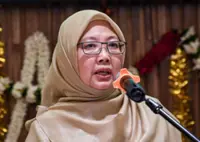ALOR GAJAH: Negotiations for an open or multi-mode toll payment system between the Works Ministry and the Finance Ministry as well as related concessionaires are being expedited, says Datuk Seri Alexander Nanta Linggi.
The Works Minister said a pilot project to enable payments through various digital payment providers as opposed to a single provider would also be conducted as soon as possible to study the implications before the new system can be finalised.
He said the multi-mode payment system was an alternative presented by the ministry pending the implementation of the multi-lane free flow (MLFF) system which is expected to begin in 2025.
"Indeed we will do it as soon as possible (because) we have to test the system first to see if it is the best before it is used throughout the country.
"Discussions have also been made with the Finance Ministry because it will involve financial implications. After all parties are satisfied with the system, a decision will be made," he said during a press conference after officiating at the launching ceremony of the Tenaga Nasional Berhad (TNB) DC fast chargers at the Ayer Keroh Rest and Service Area (RSA) of the PLUS Expressway here on Thursday (Feb 16).
Also present were Malaysian Highway Authority (LLM) director-general Datuk Mohd Shuhaimi Hassan, PLUS Malaysia Berhad board member Datuk Mohd Izani Ghani and TNB president and chief executive officer Datuk Indera Baharin Din.
Alexander said the matter was also being expedited so that the MLFF could be implemented before the 2025 target period.
He said the ministry was currently examining technical and legal issues that need to be ironed out before the system can be fully implemented.
Commenting on electric vehicles (EV), Alexander said the government was aiming for a 15% adoption rate nationwide by 2030, in line with the Low Carbon Mobility Blueprint 2021-2030.
He said other targets set in the development plan include having 9,000 AC (alternate current) charging points and 1,000 DC (direct current) charging points nationwide by 2025, and ensuring EV fast charging points were installed at least every 100km along major highways by 2023-2025. – Bernama





